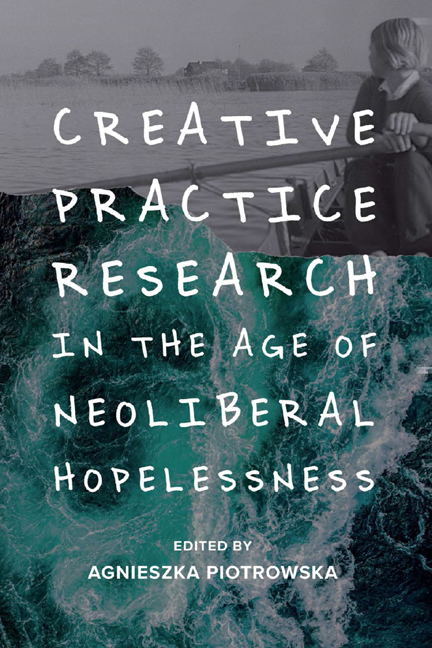Book contents
- Frontmatter
- Contents
- List of Figures
- Notes on Contributors
- Acknowledgements
- Preface: Life in the Post Pandemic Age
- Dedication
- 1 Introduction: Complexities, Compromises and Complicities
- 2 Against the Grain: Women Film Practitioners and Theorists Talk Creative Practice and Theory
- 3 Married to the Eiffel Tower: Notes on Love, Loss and Knowledge
- 4 Creativity and Neoliberalism: Between Autonomy, Resistance and Tactical Compliance
- 5 Tactical Compliance and the Persistence of Elsaesser
- 6 Storytelling and Game Playing
- 7 Autonomy and the Other Woman: Queer Active Agency and Postcolonial Expectations
- 8 From Neolithic to Neoliberal
- 9 First-person Expression on ‘Non-Western’ Screens: China as a Case Study
- 10 Scholarly Exploration of the Creative Process: Integrating Film Theory and Practice
- 11 Teaching Practice as Theory: Guerrilla Filmmaking
- 12 Baits of Falsehood: The Role of Fiction in Documentary or From Untheorised Practice to Unpractised Theory
- 13 Repented: A Creative Intersemiotic Translation
- Notes on Repented
- 14 How do you see me? The Camera as Transitional Object in Diasporic, Domestic Ethnography
- 15 ‘Shut Your Hole, Girlie. Mine's Making Money, Doll’: Creative Practice-Research and the Problem of Professionalism
- 16 Feminist ‘Pensive-creative Praxis’ and Irigaray: A Porous, Dialogical Encounter
- 17 The Paths of Creation, or How Can I Help my Dybbouk to Get Out of Me?
- 18 ‘We Want to Kill Boko Haram’: Reflections on the Photographic Representation of Children in a Displacement Camp
- 19 Between ‘Counter-movement’ (Ingold) and ‘Living with Ghosts’ (Demos)
- 20 Screen Memories: A Video Essay on Smultronstället/Wild Strawberries
- Index
1 - Introduction: Complexities, Compromises and Complicities
Published online by Cambridge University Press: 17 October 2020
- Frontmatter
- Contents
- List of Figures
- Notes on Contributors
- Acknowledgements
- Preface: Life in the Post Pandemic Age
- Dedication
- 1 Introduction: Complexities, Compromises and Complicities
- 2 Against the Grain: Women Film Practitioners and Theorists Talk Creative Practice and Theory
- 3 Married to the Eiffel Tower: Notes on Love, Loss and Knowledge
- 4 Creativity and Neoliberalism: Between Autonomy, Resistance and Tactical Compliance
- 5 Tactical Compliance and the Persistence of Elsaesser
- 6 Storytelling and Game Playing
- 7 Autonomy and the Other Woman: Queer Active Agency and Postcolonial Expectations
- 8 From Neolithic to Neoliberal
- 9 First-person Expression on ‘Non-Western’ Screens: China as a Case Study
- 10 Scholarly Exploration of the Creative Process: Integrating Film Theory and Practice
- 11 Teaching Practice as Theory: Guerrilla Filmmaking
- 12 Baits of Falsehood: The Role of Fiction in Documentary or From Untheorised Practice to Unpractised Theory
- 13 Repented: A Creative Intersemiotic Translation
- Notes on Repented
- 14 How do you see me? The Camera as Transitional Object in Diasporic, Domestic Ethnography
- 15 ‘Shut Your Hole, Girlie. Mine's Making Money, Doll’: Creative Practice-Research and the Problem of Professionalism
- 16 Feminist ‘Pensive-creative Praxis’ and Irigaray: A Porous, Dialogical Encounter
- 17 The Paths of Creation, or How Can I Help my Dybbouk to Get Out of Me?
- 18 ‘We Want to Kill Boko Haram’: Reflections on the Photographic Representation of Children in a Displacement Camp
- 19 Between ‘Counter-movement’ (Ingold) and ‘Living with Ghosts’ (Demos)
- 20 Screen Memories: A Video Essay on Smultronstället/Wild Strawberries
- Index
Summary
I am delighted to present you with this unruly collection, featuring essays by practitioners and theorists who have reflected on how practice research can offer different ways of producing knowledge or ‘knowledges’– or perhaps just different ways of producing work which has artistic ambitions as well as academic ones.
The book is a collection of essays inspired by, but in no way limited to, the Symposium on Creative Practice Research I organised at the University of Bedfordshire in May 2018 supported by my inimitable PhD student Priyanka Verma. The event was an enormous success coming as it did in the midst of discussions about the position of practice research in the British university system and its preparations for the Research Excellence Framework of 2021. I venture that its taking place at a ‘new’ (meaning not Russell Group) university contributed to the sense of us doing something dangerous and on the peripheries of the restrictive academic environment. There were international participants too and we were keen to compare the different approaches globally. We were very keen to have a record of our discussions and proceedings and the book in some way is just that, although a number of people who were very important voices during the conference, including my students, for a number of reasons are not part of this collection. The reasons are many, but one has to say clearly, and perhaps brutally, that not all creative film or theatre practitioners enjoy writing, and academic writing in particular. Therein lies one of the REF problems, although of course the REF managers would dispute it.
This book is proud to include voices from different cultural and ethnic backgrounds and some of the writers address issues of post-colonialism head on. This is my fourth edited collection (including two co-edited with Ben Tyrer) since I completed my doctoral work a few years ago, after a career in the television industry. My edited collections are ‘unruly’ because these volumes attempt to create a space which is not readily regimented. That is not to say that there is not one overarching ambition in this particular collection. The idea guiding this book is the notion of reclaiming the subjective, and at times the deeply personal, as the legitimate site of knowledge, particularly in creative practice research in which a personal undertaking, reflection and commitment to work carried out defines the knowledge it produces.
- Type
- Chapter
- Information
- Publisher: Edinburgh University PressPrint publication year: 2020



